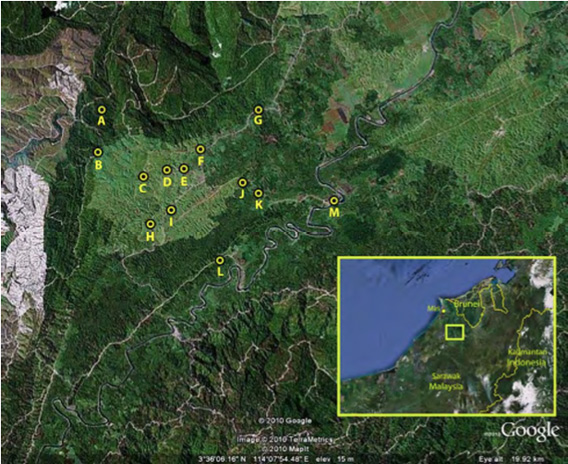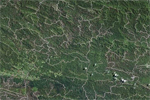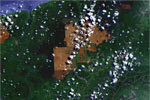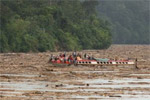
Location map showing key areas visited during field study by the NGO Grassroots (from Case study of IOI Pelita Plantations operations and practices, and its impact upon the community of Long Teran Kanan, Tinjar, Baram, Sarawak, Malaysia): A) IOI workers’ housing B) View of recent land clearing activities by IOI C) IOI’s agrochemical storage and mixing area |
A Malaysian palm oil company facing criticism for a land dispute with forest people in Borneo has been suspended from the Roundtable on Sustainable Palm Oil (RSPO), an eco-certification body.
RSPO said IOI Corp breached “two core membership mandates and obligations” on land conflict and conversion of high conservation forest into oil palm plantations. IOI Corp will have 28 days to deliver a proposal to resolve the outstanding issues. Should it fail to do so by May 2, 2011, RSPO told IOI it will consider “further sanctions against your company, which may include the suspension of your license for new transactions involving Certified Sustainable Palm Oil materials including GreenPalm certificates.”
Such a move could cost IOI dearly in the marketplace. In 2009 and 2010, PT Sinar Mas Agro Resources and Technology (PT SMART), an Indonesian subsidiary of Golden Agri Resources, lost a number of major customers after it was found to be clearing carbon-dense peatlands and rainforests in Indonesian Borneo. Unilever, Kraft, and Nestle were among the companies that abandoned PT SMART, which has since announced a strict forest policy for new plantations.
The rebuke from RSPO comes just days after the Rainforest Action Network (RAN) highlighted the struggle between the people of Long Teran Kenan and IOI over two plantations on native lands in Baram, Sarawak in Malaysian Borneo. Last month the community seized the contested plantations after the palm oil giant failed to respect the terms of a court ruling that the plantations were established on native customary land.
According to the San Francisco-based activist group, the action came after months of inaction by IOI, following the March 2010 court decision that two concessions held by the palm oil company were planted on community lands. Despite the ruling, IOI continued to operate its plantations. It also broke its commitment not to appeal the court decision, according to RAN. So last month, the people of Long Teran Kenan blocked the road and occupied the plantation. They have since started harvesting and selling the fruit to a nearby palm oil mill.
RAN is campaigning around the situation because IOI supplies palm oil to Cargill, America’s largest palm oil importer. RAN says Cargill has failed to enact policies that protect against such abuses.
Cargill did not respond to request for comment from mongabay.com, but in the past the agroindustrial giant has stood behind its suppliers.
In an emailed statement, IOI called the community’s actions “illegal” and said the natives’ customary rights on the land “can be extinguished by paying compensation.”
But Linsey Allen, RAN’s Forest Program Director, told mongabay.com IOI’s response reflected its “lack of commitment to respectful engagement with people of Long Teran Kenan.”
“Rainforest Action Network disputes IOI’s accusation that the native customary landholders are ‘illegal’ and will continue to stand in solidarity with the community of Long Teran in its fight to reclaim ancestral lands from one of the most powerful palm oil companies if the world,” she said.
Related articles
Google Earth reveals stark contrast between Sarawak’s damaged forests and those in neighboring Borneo states
(03/28/2011) Images from Google Earth show a sharp contract between forest cover in Sarawak, a state in Malaysian Borneo, and the neighboring countries of Brunei and Indonesia at a time when Sarawak’s Chief Minister Pehin Sri Abdul Taib Mahmud is claiming that 70 percent of Sarawak’s forest cover is intact.
Report: corruption in Sarawak led to widespread deforestation, violations of indigenous rights

(03/10/2011) At the end of this month it will be 30 years since Abdul Taib Mahmud came to power in the Malaysian state of Sarawak. Environmentalists are using the occasion, along with new revelations, to highlight corruption and nepotism they say have characterized his regime. Chief Minister Taib and his decades-long administration are no strangers to such allegations, but a new report from the indigenous-rights group Bruno Manser Fund (BMF)—amid criticism from independent media sources, such as Sarawak Report and Radio Free Sarawak—are adding fuel to the fire. Most recently, the report describes in great detail how the tropical timber trade in Sarawak has undercut indigenous groups while toppling some of the world’s greatest rainforests, all at the expense of the Sarawak people.
Sarawak’s last nomad: indigenous leader and activist, Along Sega, dies

(02/03/2011) Along Sega never knew exactly how old he was, but when he passed away yesterday in a hospital far from the forest where he born, he was likely in his 70s. Leader among the once-nomadic hunter and gatherer Penan people of Borneo and mentor to Swiss activist, Bruno Manser, Along Sega will be remembered for his work to save the Penan’s forest—and their lifestyle and culture—from logging companies, supported by the Sarawak government and provided muscle by the state police.
Malaysian palm oil producers destroying Borneo peat forests faster than ever before

(02/01/2011) Peatlands and rainforests in Malaysia’s Sarawak state on the island of Borneo are being rapidly destroyed for oil palm plantations, according to new studies by environmental group Wetlands International and remote sensing institute Sarvision. The analysis shows that more than one third (353,000 hectares or 872,000 acres) of Sarawak’s peatswamp forests and ten percent of the state’s rainforests were cleared between 2005 and 2010. About 65 percent of the area was converted for oil palm, which is replacing logging as timber stocks have been exhausted by unsustainable harvesting practices.
Sarawak to double oil palm plantations by focusing on native customary forest
(11/30/2010) Sarawak plans to double its oil palm estate by 2020, reports The Star.
Misleading claims from a palm oil lobbyist
(10/23/2010) In an editorial published October 9th in the New Straits Times (“Why does World Bank hate palm oil?”), Alan Oxley, a former Australian diplomat who now serves as a lobbyist for logging and plantation companies, makes erroneous claims in his case against the World Bank and the International Finance Corp (IFC) for establishing stronger social and environmental criteria for lending to palm oil companies. It is important to put Mr. Oxley’s editorial in the context of his broader efforts to reduce protections for rural communities and the environment.
Photos: Massive logjam in Borneo blocks Malaysia’s longest river

(10/10/2010) A massive 50-km-long (30-mi) logjam has blocked the Rajang river in Sarawak, Malaysian Borneo, bringing river traffic to a standstill and posing a threat to riverbank communities, reports Malaysian state media, Bernama. The Rajang, Malaysia’s longest river, is presently unnavigable, according to Bernama. The source of the logs and debris is believed to be the Baleh River and upper tributaries of the Rajang. Heavy rain reportedly triggered a landslide or landslides at log ponds at a major timber camp.







